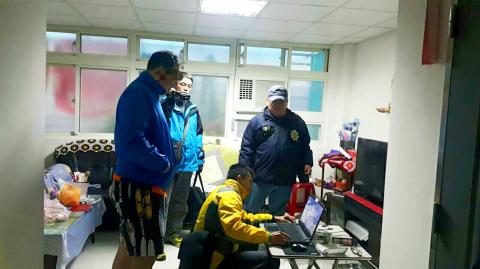People could be prosecuted for downloading child pornography with peer-to-peer (P2P) software, a top prosecutor said yesterday following the arrests of two suspects through Operation Centurion Plus, an international collaboration with the FBI.
The judiciary would bring charges against people who use P2P apps to obtain pornographic photographs or videos involving children, Taoyuan Chief Prosecutor Hsieh Wen-chi (謝雯璣) said, adding that P2P software uploads the content by default, making users liable for spreading such material.
“When someone starts to download a file on a P2P system, it is also being uploaded. Therefore, a person downloading the file is also uploading it, which is deemed to be circulating the file in violation of the law,” Hsieh said.

Photo: Huang Liang-chieh, Taipei Times
Circulating child pornography contravenes provisions of the Child and Youth Sexual Exploitation Prevention Act (兒童及少年性剝削防制條例), which carries a maximum prison term of three years, she added.
When using P2P apps, people must take care to avoid downloading sexually explicit material that violates the law, as well as material that infringes on copyright law, such as films currently showing in theaters, Hsieh said.
The warning came after high-profile arrests on Monday in New Taipei City and Kaohsiung, in which two men, surnamed Wen (溫), 30, and Ho (何), 37, were picked up for allegedly downloading and circulating massive amounts of child pornography.
Police touted the arrests, as they were carried out via cooperation between the Criminal Investigation Bureau and the FBI’s police section for protecting women and children under Operation Centurion Plus, which monitors child pornography file-sharing activities worldwide.
The men were ranked 30th and 33rd among the top 100 suspects globally who have downloaded the highest volume of child pornography, bureau officials said.
Twenty terabytes of about 2,500 such videos have been found in two computers and six hard drives seized from the suspects, the officials added.
Most of the files depict sex acts between children and adults, with the majority appearing to originate from US, Europe and Southeast Asia, as they feature Caucasian and Asian people, while others were of young boys and girls having sex, officials said.
There were also videos showing adult men raping children, with one officer saying: “Some of the videos are very deviant — it was really sickening to watch.”
Police quoted Ho as saying during questioning that he was curious about these videos and used P2P apps to download them for his own private viewing, not for sharing, police said.
Ho works at a job bank and is married, but asked police not to tell his wife about the nature of the arrest, investigators said.
Wen lives alone in a rented apartment and works at an electronics factory, they said.
The investigation is still ongoing due to the large volume of material, police said, adding that they would ask prosecutors to charge the suspects.

MORE VISITORS: The Tourism Administration said that it is seeing positive prospects in its efforts to expand the tourism market in North America and Europe Taiwan has been ranked as the cheapest place in the world to travel to this year, based on a list recommended by NerdWallet. The San Francisco-based personal finance company said that Taiwan topped the list of 16 nations it chose for budget travelers because US tourists do not need visas and travelers can easily have a good meal for less than US$10. A bus ride in Taipei costs just under US$0.50, while subway rides start at US$0.60, the firm said, adding that public transportation in Taiwan is easy to navigate. The firm also called Taiwan a “food lover’s paradise,” citing inexpensive breakfast stalls

TRADE: A mandatory declaration of origin for manufactured goods bound for the US is to take effect on May 7 to block China from exploiting Taiwan’s trade channels All products manufactured in Taiwan and exported to the US must include a signed declaration of origin starting on May 7, the Bureau of Foreign Trade announced yesterday. US President Donald Trump on April 2 imposed a 32 percent tariff on imports from Taiwan, but one week later announced a 90-day pause on its implementation. However, a universal 10 percent tariff was immediately applied to most imports from around the world. On April 12, the Trump administration further exempted computers, smartphones and semiconductors from the new tariffs. In response, President William Lai’s (賴清德) administration has introduced a series of countermeasures to support affected

CROSS-STRAIT: The vast majority of Taiwanese support maintaining the ‘status quo,’ while concern is rising about Beijing’s influence operations More than eight out of 10 Taiwanese reject Beijing’s “one country, two systems” framework for cross-strait relations, according to a survey released by the Mainland Affairs Council (MAC) on Thursday. The MAC’s latest quarterly survey found that 84.4 percent of respondents opposed Beijing’s “one country, two systems” formula for handling cross-strait relations — a figure consistent with past polling. Over the past three years, opposition to the framework has remained high, ranging from a low of 83.6 percent in April 2023 to a peak of 89.6 percent in April last year. In the most recent poll, 82.5 percent also rejected China’s

PLUGGING HOLES: The amendments would bring the legislation in line with systems found in other countries such as Japan and the US, Legislator Chen Kuan-ting said Democratic Progressive Party (DPP) Legislator Chen Kuan-ting (陳冠廷) has proposed amending national security legislation amid a spate of espionage cases. Potential gaps in security vetting procedures for personnel with access to sensitive information prompted him to propose the amendments, which would introduce changes to Article 14 of the Classified National Security Information Protection Act (國家機密保護法), Chen said yesterday. The proposal, which aims to enhance interagency vetting procedures and reduce the risk of classified information leaks, would establish a comprehensive security clearance system in Taiwan, he said. The amendment would require character and loyalty checks for civil servants and intelligence personnel prior to